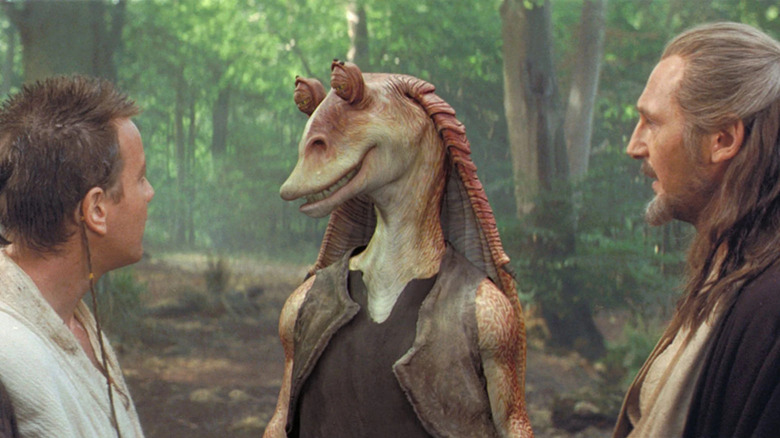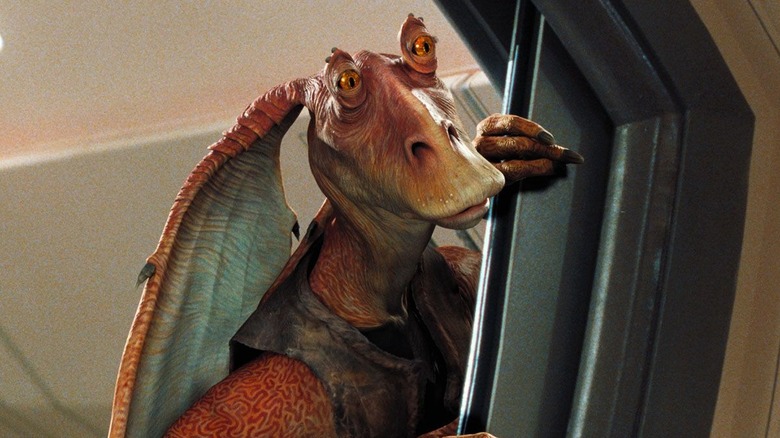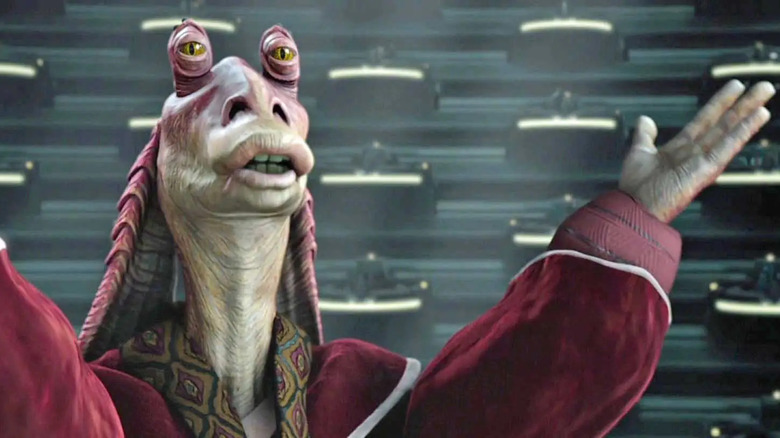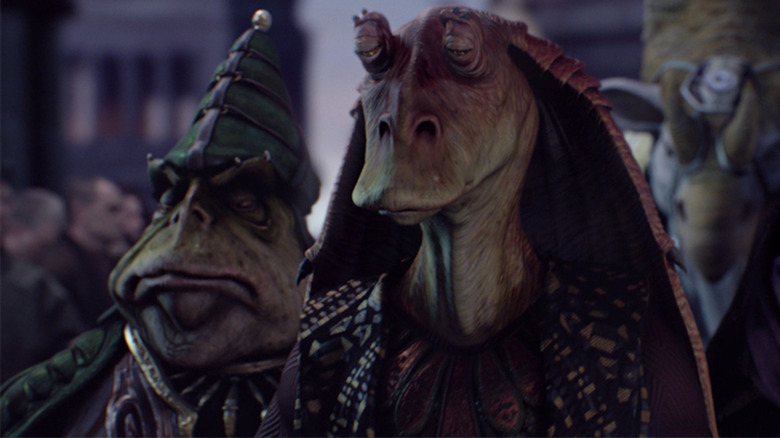The Jar Jar Binks Hatred From Star Wars Fans Hit Ahmed Best With A Deep Depression
Those who were alive in 1999 will be able to recall the tremendous drama surrounding the release of George Lucas' "Star Wars: Episode I — The Phantom Menace." It was perhaps one of the most anticipated films of all time, with some audience members camping out on sidewalks for days, waiting to get tickets (a necessity in a time prior to internet ticket sales). Before streaming technology was widely available (YouTube didn't debut until 2005), people used their dial-up modems to download the "Phantom Menace" trailer, a practice that took the better part of a day. The film bow to respectful, if modest, applause from critics.
But very quickly, public perception turned sour. Many soon recognized that the script was clunky, the story wasn't terribly interesting, and the characters were flat, dray, and inhuman. Many pointed specifically to Jake Lloyd, who played the young Anakin Skywalker, as one of the central reasons the film didn't work. Lloyd was so horribly bullied, he was essentially forced out of acting altogether. His horrid relationship with "Star Wars" is on record.
Many also zeroed in on Ahmed Best, who provided the voice and on-camera movements for the comedic humanoid amphibian Jar Jar Binks. Jar Jar had a strange patois and his antics served as the film's comic relief. Many audiences didn't appreciate a slapstick character like Jar Jar in the ordinarily more staid world of "Star Wars," and he was violently rejected by fans as one of the most irritating things ever. Some critics even saw Jar Jar as a racist stereotype, with the Wall Street Journal comparing the character to Stepin Fetchit, the Black Vaudeville comedian whose shtick banked in racist imagery.
Ahmed Best, as one might imagine, was deeply depressed at the reactions.
Yousa people gonna die?
The interpretation of Jar Jar as a racist stereotype was so pervasive, there was even a joke about it in "South Park: Bigger, Longer & Uncut," a film that was released only a month and a half after "The Phantom Menace" hit theaters. Knowing that additional "Star Wars" films would follow "The Phantom Menace," George Lucas and Ahmed Best scrambled — quite reluctantly — to reduce Jar Jar's role in them. In the 2002 film "Star Wars: Episode II — Attack of the Clones," Jar Jar was given the role of unwittingly handing power over to Chancellor Palpatine (Ian McDiarmid), the film's villain. in "Star Wars: Episode III — Revenge of the Sith," he barely appears at all.
In a 2002 article in Entertainment Weekly, Best addressed accusations that Jar Jar was conceived of as a racist caricature. Best said that his inspirations for the character were Buster Keaton and Jerry Lewis, and has nothing to do with racist minstrel shows of the past:
"There were absolutely no intentions of the character being perceived that way. [...] People ask me, 'Did you know it was going to be this way? Why didn't you stop it?' I didn't stop it because there was nothing to stop."
Something that Best was unable to stop, however, was continued — and increasingly strong — hatred for the character ... and for him. "Star Wars" fans became overwhelmingly venomous toward Best in particular, and he confessed in a 2019 interview with IndieWire that he felt his professional life was at an end. A deep and prolonged depression followed him for years, and Best found himself in some dark places.
'I took it personally.'
Ahmed Best admitted that the pool of hatred he found himself in led him to contemplate dying by suicide. Previously a mime and stage performer, Best felt he was creating something unique and fun with George Lucas. Neither of them expected such a visceral, intense reaction. Best explained:
"I faced a media backlash that really made me feel like my life was over. [...] It wasn't just the hatred, though — it was where it came from. There was just so much hate and anger and venom directed at me, and I took it personally. [...] I put a lot of me into that work, and if you talk to any artist who really cares about their work, you're talking about them."
The accusations of racism were especially galling to Best, a Black man, who had been sharply aware of stereotypes — and the fraught journey of Black artists — all his life. That fans assumed he was being deliberately complicit in something so terrible broke Best's heart:
"The hardest part for me in that entire situation was all of the criticism that came from a racially motivated point of view. Growing up, being Black, and wanting to be an artist — which is a very challenging and brave thing to do, it's not easy — we're always faced, as Black artists, with this idea of being a sellout. We have our guard up when it comes to being portrayed as an Uncle Tom, a racist stereotype, or anything that makes you, as a Black person, look less than."
Best felt tired of having to explain himself and recalled a dark night, walking across the Brooklyn Bridge in the fog, when the darkness nearly took hold. Best described his whole experience in a Participant video.
Sharing with his son
Ahmed Best would later revisit the very spot on the Brooklyn Bridge when things were darkest for him, but this time he would bring his son. He was able to see that brightness could eventually prevail. Eventually, Best's relationship with "Star Wars" became easier to stomach. By 2019, he would appear on stage at a "Star Wars" Celebration convention in Chicago ... to be greeted by cheers. In recent years, many have reassessed the quality of the "Star Wars" prequel films, and many of the film's younger fans have grown up more appreciative than the initial vitriol would have you believe.
Jar Jar is still not beloved, but Best learned to roll with the mockery a little, playing Jar Jar in episodes of "Robot Chicken," and reprising the role for the unmade "Star Wars" comedy series "Star Wars: Detours."
Best has since been welcomed back as the character Kelleran Beq, a Jedi he played on "Jedi Temple Challenge" before reprising the role on "The Mandalorian." It was an appearance that, in many ways, redeemed both the actor and Jar Jar in many fans' eyes. Best, we are all grateful to see, has emerged a better person.
Sadly, this isn't always the case. Jake Lloyd has infamously had a difficult life after his appearance in "The Phantom Menace," and actor Kelly Marie Tran was notoriously bullied off of social media after her appearance in "Star Wars: The Last Jedi."
The lesson here remains directed at the world's angrier "Star Wars" fans: if you dislike a movie or a character, merely dislike it. Hate the characters or the writing or the concepts. But, for goodness sake, where are the anger and the cruelty coming from? Targeting single actors is brutish and does real psychological damage. Cut it out.



